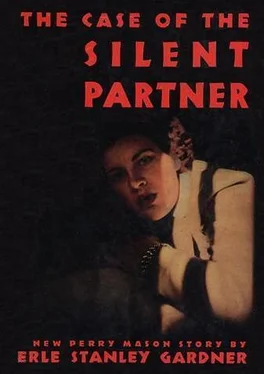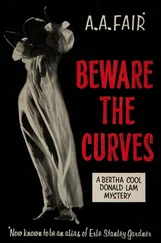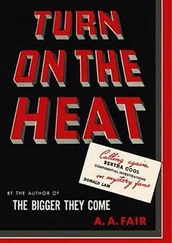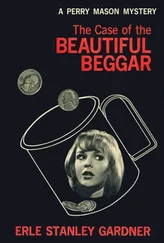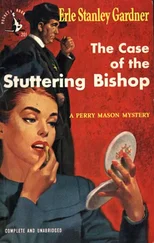Erle Gardner - Case of the Silent Partner
Здесь есть возможность читать онлайн «Erle Gardner - Case of the Silent Partner» весь текст электронной книги совершенно бесплатно (целиком полную версию без сокращений). В некоторых случаях можно слушать аудио, скачать через торрент в формате fb2 и присутствует краткое содержание. Город: New York, Год выпуска: 1940, Издательство: William Morrow, Жанр: Классический детектив, на английском языке. Описание произведения, (предисловие) а так же отзывы посетителей доступны на портале библиотеки ЛибКат.
- Название:Case of the Silent Partner
- Автор:
- Издательство:William Morrow
- Жанр:
- Год:1940
- Город:New York
- ISBN:нет данных
- Рейтинг книги:4 / 5. Голосов: 1
-
Избранное:Добавить в избранное
- Отзывы:
-
Ваша оценка:
- 80
- 1
- 2
- 3
- 4
- 5
Case of the Silent Partner: краткое содержание, описание и аннотация
Предлагаем к чтению аннотацию, описание, краткое содержание или предисловие (зависит от того, что написал сам автор книги «Case of the Silent Partner»). Если вы не нашли необходимую информацию о книге — напишите в комментариях, мы постараемся отыскать её.
Case of the Silent Partner — читать онлайн бесплатно полную книгу (весь текст) целиком
Ниже представлен текст книги, разбитый по страницам. Система сохранения места последней прочитанной страницы, позволяет с удобством читать онлайн бесплатно книгу «Case of the Silent Partner», без необходимости каждый раз заново искать на чём Вы остановились. Поставьте закладку, и сможете в любой момент перейти на страницу, на которой закончили чтение.
Интервал:
Закладка:
Mason smiled. “In any event, Mr. Coll,” he said, “Lynk wanted Peavis to be out there at Lilac Canyon with the money, didn’t he? Whether it was to be given as compensation for services performed or as the purchase price of stock?”
“I... well... I don’t know what he wanted. I can’t remember exactly what was said.”
Mason said, “That’s all.”
Labley said, “In Lilac Canyon, Mr. Coll?”
Coll jumped as though a pin had been stuck into him. “No, no,” he said. “I didn’t mean that. No, certainly not. He didn’t say anything about Lilac Canyon. He just said — well, he said Peavis had better get his dough ready because the stock was in his hands.”
“Did Mr. Lynk tell Mr. Peavis where to bring that money?” Labley asked.
“No, sir. He did not.”
Labley hesitated a moment, glanced dubiously at the frankly skeptical face of Judge Grosbeck, and said, “That’s all.”
The judge settled back in his chair and half closed his eyes, knowing that the preliminary having been laid, it would be good procedure for Mason to clamp down on Coll and rattle him with a running fire of cross-examination before he could recover his self-possession. The judge, who had every intention of giving Mason plenty of leeway, composed his features into an expression of judicial impassivity.
But Mason surprised everyone by saying, “That’s all, Mr. Coll.”
Coll avoided Labley’s eyes as he left the witness stand.
“Esther Dilmeyer,” Mason said.
She came forward and held up her hand to be sworn — very chic in a soft black wool jacket dress and a tiny black hat. The only touch of color was a gold pin at her throat and a matching bracelet on her left wrist.
Judge Grosbeck looked at her curiously. Labley seemed somehow ill at ease.
Mason said, “Your Honor, this young woman has just been discharged from the hospital. An attempt was made to poison her, and her recovery was...”
“The court understands the facts generally,” Judge Grosbeck said, looking at Esther Dilmeyer.
She gave her name and address to the court reporter, and smiled at Mr. Mason.
“Miss Dilmeyer,” Mason said casually, “you’re acquainted with Mr. Peavis?”
“Yes.”
“And have been for some time?”
“Well, a few weeks.”
“And, at his suggestion, you made it a point to become acquainted with Mr. Robert Lawley?”
“No.”
“No?” Mason asked, raising his eyebrows.
“No, sir.”
“Who did make that suggestion?”
Labley jumped to his feet. “Your Honor,” he said, “it is incompetent, irrelevant and immaterial.”
Judge Grosbeck looked at Mason curiously. “I’d be glad to hear from you on that point, Mr. Mason,” he said.
Mason’s manner was quietly matter-of-fact. He said, “Your Honor, there are two horns to the dilemma which confronts the plaintiff in this action. Either he can appear in the rôle of holding himself out as a prospective purchaser for the stock in question, in which event the fact that Lynk died before the stock could be sold leaves the plaintiff with no right whatever to maintain his action; or he can adopt the position that Lynk was his agent, purchasing the stock for the plaintiff in this action. That is the only theory on which he can maintain the present action. The minute he adopts that theory, he becomes responsible for everything which Lynk, as his agent, did. Now then, in place of seeking a legal remedy, he has sought an equitable remedy. He is now in a court of equity. It is an axiom that he who comes to equity must come with clean hands. If the actions of his agent, Lynk, in obtaining this stock were such as to shock the conscience, if he employed illegal means, or if he resorted to entrapment, fraud, or oppression, then the plaintiff is not entitled to an equitable remedy because the courts of equity won’t let him cross the threshold.”
Judge Grosbeck nodded.
Labley jumped to his feet. “Why, Your Honor, I don’t understand such to be the law.”
“It is,” Judge Grosbeck said, with calm finality.
“But Peavis didn’t know anything about what Lynk was doing.”
“If Lynk was his agent,” Judge Grosbeck said, “it was his duty to notify Peavis of everything he was doing. His actions were for the benefit of Peavis. Peavis can’t accept the benefit of those actions and refuse to assume the responsibility.”
Labley sat down slowly, cautiously, as though after what had happened, it would not have surprised him if the chair had suddenly been jerked out from under him.
Mason said, “I’ll put it this way, Miss Dilmeyer. You were told that Mr. Lawley owned some stock in a company which Peavis wanted. You were, therefore, asked to be nice to Lawley and...”
“No one told me any such thing,” she said.
Mason raised his eyebrows. “They didn’t?”
“No.”
“How did you get acquainted with Mr. Lawley?”
“I was told to cultivate his acquaintance.”
“By whom?”
“By Mr. Coll,” she said.
Labley smiled triumphantly.
“And Peavis had nothing whatever to do with Mr. Coll. Coll was not his agent,” Labley said to the judge.
“That,” Judge Grosbeck remarked, “remains to be determined.”
“Now then,” Mason said, “on the night that Mr. Lynk was murdered, did you hear any conversation between Lynk and Coll about the stock?”
“Not that night. That afternoon.”
“What did Mr. Lynk say?”
“Lynk said that he had the stock in his possession, that if Peavis wanted to get hold of it, he’d have to meet him before midnight with cold, hard cash, that Lynk didn’t want any checks. He wanted cash.”
“You heard that conversation?” Mason asked.
“Yes, sir.”
“Where did it take place?”
“In the Golden Horn.”
“That’s a nightclub?”
“Yes, sir.”
“Where in the Golden Horn did the conversation take place?”
“In an upstairs — well, in an upstairs suite of rooms.”
“And after you had heard that conversation,” Mason said, “an attempt was made on your life, is that right?”
“I object,” Labley shouted. “That is an attempt to prejudice the court. It is a plain intimation that my client has resorted to an attempted murder in order to enable him to buy a few shares of stock in a corporation.”
Judge Grosbeck looked at Mason with cold, judicial impassivity. “Counselor,” he asked ominously, “is it your contention that there is a connection between the two events?”
Mason said, “If the court will bear with me, I think that perhaps we will uncover some rather valuable evidence. The question relates only to a point of time. Your Honor is far too experienced to be influenced by insinuations which are not substantiated. It is not as though a jury were trying the case.”
Judge Grosbeck nodded. “Proceed,” he said.
“Answer the question,” Mason ordered Esther Dilmeyer.
She said, “Yes,” in a very low voice.
“Now,” Mason said, “your manner of eating candy is rather unusual, isn’t it? You eat piece after piece, very rapidly?”
“Well, perhaps, yes.”
“How long have you had that habit?”
“Ever since I was nineteen when I had a job in a candy factory,” she said with a smile.
“You learned to eat candy in that way while employed there?”
“Yes,” she said, and laughed lightly. “The girls weren’t supposed to eat any of the candy on which they were working, but — well, I didn’t like the boss and thought I was getting even with him.”
“I see,” Mason said with a smile. “Now, someone must have known of your propensities for eating one piece of candy right after another.”
Читать дальшеИнтервал:
Закладка:
Похожие книги на «Case of the Silent Partner»
Представляем Вашему вниманию похожие книги на «Case of the Silent Partner» списком для выбора. Мы отобрали схожую по названию и смыслу литературу в надежде предоставить читателям больше вариантов отыскать новые, интересные, ещё непрочитанные произведения.
Обсуждение, отзывы о книге «Case of the Silent Partner» и просто собственные мнения читателей. Оставьте ваши комментарии, напишите, что Вы думаете о произведении, его смысле или главных героях. Укажите что конкретно понравилось, а что нет, и почему Вы так считаете.
